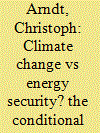| Srl | Item |
| 1 |
ID:
114316


|
|
|
|
|
| Publication |
2012.
|
| Summary/Abstract |
Based on data from a face-to-face survey of 2422 residents from urban Turkey, this paper presents an analysis of citizens' preferences in Turkey on nuclear and renewable energy sources. Findings indicate that opposition to nuclear power was strong, and only a small number of respondents endorsed it by listing it in their top two choices. Conversely, almost two-thirds of the sample endorsed investment in renewable energy sources (such as wind and solar), and only a small minority was opposed to it. Econometric analyses revealed that knowledge of the climate change problem was a common factor that explained endorsement of both nuclear and renewables. Yet, high levels of concern for the environment and a negative perception regarding its future differentiated the endorsers of renewables from those of nuclear energy. Endorsers of nuclear energy were found to be males who were knowledgeable about climate change and engaged in environmental issues, but less concerned about the environment, and optimistic about its future. Nuclear opponents, on the other hand, were found to be concerned about the environment, pessimistic about its future, and not fully relying on technology.
|
|
|
|
|
|
|
|
|
|
|
|
|
|
|
|
| 2 |
ID:
191240


|
|
|
|
|
| Summary/Abstract |
The decarbonisation of Western societies requires a fundamental reorganisation of energy supply and fierce debates around the future energy mix have begun in many countries. However, we still know little about how concerns about energy security affect the public's energy preferences in view of the critique that renewable energies might compromise energy security. This paper argues that there is a perceived trade-off between energy security and climate protection that affects energy supply preferences in Western Europe. Using the European Social Survey's ‘Public Attitudes to Climate Change’ module, the findings from multilevel regressions demonstrate that there is indeed a perceived trade-off in energy preferences among Western Europeans. People concerned about energy security prefer coal, gas, and nuclear power over renewable energies. People worried about climate change prefer solar and wind energy over nuclear and fossil forms of energy. The analysis further identifies four different groups representing the trade-off between energy security and climate protection among Western Europeans. The paper thus identifies why energy preferences might collide and why some countries observe a polarisation of views around energy supply that policymakers need to address to realise a successful and publicly acceptable transformation of energy supply.
|
|
|
|
|
|
|
|
|
|
|
|
|
|
|
|